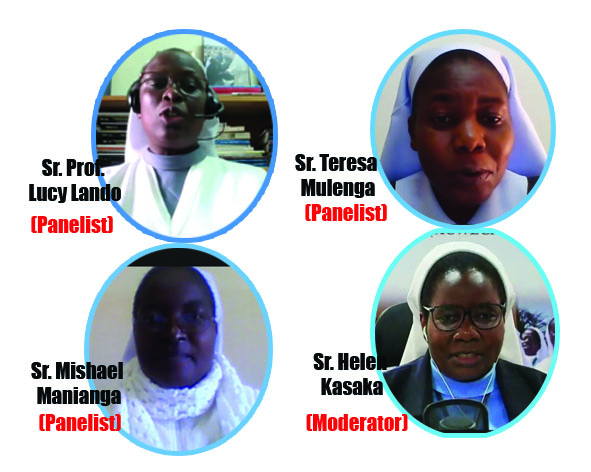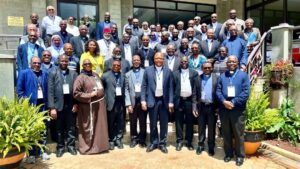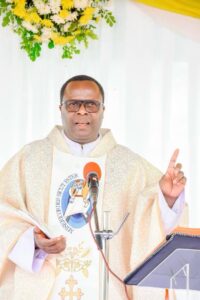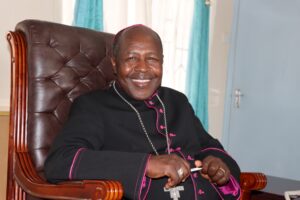ACWECA: On Synodality, Catholic Nuns Call for Re-Examination of Traditional Roles of Consecrated Women in the Church

Consecrated women panalists
Sr. Jecinter Antoinette Okoth, FSSA
Panelists from the Association of Consecrated Women in Eastern and Central Africa (ACWECA) have called for examination of traditional responsibilities of Religious women in the Church, highlighting education as a significant element for Consecrated women to qualify in participating more in Church activities.
Speaking at a zoom webinar that brought together Consecrated women from Africa on Thursday, April 28, to share their dreams, communion and participation in the Church towards the ongoing synodal process, panelist Sr. Prof. Agnes Lucy Lando said: “The perception that Consecrated women are to stay in their traditional apostolates, in my view, need to be critically examined during this synodal period.”
As the entire Church participates in the first stage of Synod on Synodality process which has opened doors for participation of all without anyone being left behind, Sr. Prof. Lando a member of the Sisters of Mary of Kakamega underscores that “We (Consecrated women) need to interrogate how our respective charisms and spiritualities can still be used to serve the wider Church in the context of emerging needs.”
Based on this, the Kenyan nun who is currently the Director of Research and Postgraduate Studies at Daystar University, expressed the need for religious women to invest on studies so they can be relevant in making substantial decisions whenever approached.
“We need administration courses, we need management courses and to enable us be at the top management of higher institutions of learning and also to manage temporal good of the Church,” Sr. Prof. Lando said adding that “these require that some financial resources be set aside to offer specialized training to consecrated women who have the aptitude to pursue those studies for the good of the Church.”
Additionally, “for Consecrated women to serve as theological experts, to serve in bishops conferences or even in Vatican Dicasteries to advise the Pope, we need them to be experts in their subject matter,” the Catholic don who serve as the Chair of Daystar University’s Chancellor’s Forum shared with online participants at the session convened by African Synodality Initiative, a project of the Jesuit Conference of Africa and Madagascar (JCAM) in collaboration with the Symposium of Episcopal Conferences of Africa and Madagascar (SECAM).
Echoing Sr. Prof. Lando’s sentiments on re-examining traditional roles of consecrated women and stressing on acquiring the right qualifications for Religious women to have the capacity to make better decision in church fora, Sr. Teresa Mulenga the Programs Coordinator of the African Sisters Education Collaborative (ASEC) said, “nobody can give what she or he doesn’t have.”
“Religious women are central as far as the evangelization is concerned. Looking at their prophetic style, there is no way the Church can keep on moving without looking at what Religious women are doing at the grassroots,” Sr. Mulenga a member of the Sisters of St. Theresa of the Child Jesus revealed and continued, “In terms of decision making, the Church has been male dominated for quite a long period of time, not because of selfish reasons but more still need to be done for the Religious women.”
“This tells us that we have a lot of Religious women who are not up to the task and there are so many barriers in our way,” the Malawian nun shared revealing that cultural and traditional practices have put the woman at the back and at the same time, Religious women also lack academic preparation.”
In her observation Sr. Mulenga notes that Religious women serve people in the peripheries of the society and amidst that, “institutional capacity building for effective delivery of services by the Religious women as well as fulfilling their Charism with this professionalism is essential.”
With professional development, the nun said, “Religious Women will have the opportunity to interact with the people and influence them through their different ministries as they fulfill their charisms and spiritual values. So this professional development gives Sisters an opportunity to respond better to the needs of the society and to influence those they are working with.”
Focusing on how the Religious women partake in the synod theme “For a Synodal Church: Communion, Participation and Mission,” in their daily living, Sr. Mishael Manianga acknowledged that Consecrated women embrace team leadership style that promotes working together and “Inspired by deep listening to the spirit of God as a congregation engages in mission, is a sign of solidarity.”
“Team leadership appreciates a collaboration and reflection process as tools for decision making, and these too promote collective listening that allows greater participation of members,” Sr. Manianga assistant Superior General of the Religious Sisters of the Holy Spirit in Zambia shared with the online participants who were mainly Religious nuns from Africa and beyond.
According to Sr. Manianga therefore, collective listening and participatory leadership speak a lot about synodality which is creating a space where everyone can be heard.
She further acknowledged the visibility and presence of many consecrated African women in various pastoral assignments beyond the parish ministry, who, by virtue of their leadership, participate in decision making, either as head or staff members of those particular institutions where they serve.


